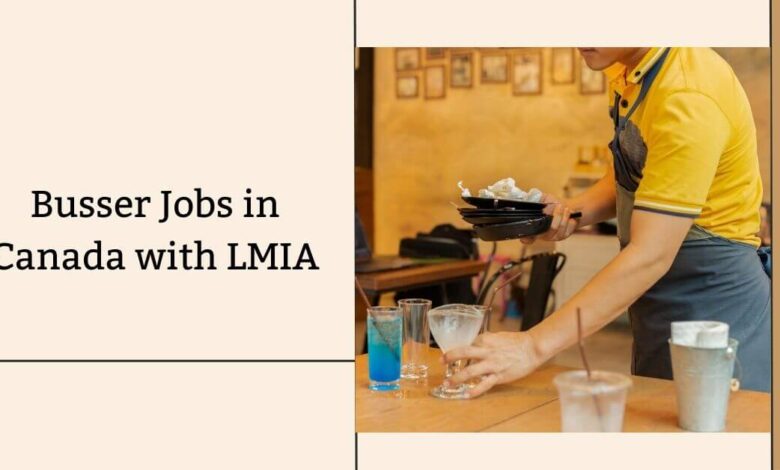Busser Jobs in Canada with LMIA 2026 – Apply Now

Looking to start your Canadian journey in hospitality? Becoming a busser could be your golden ticket. Far from being “just a support role,” bussers are the backbone of restaurants keeping operations smooth, tables clean, and customers happy.
With average wages of $15.50–$17.00 per hour plus shared tips, flexible full-time hours, and perks like free staff meals and visa sponsorship, this is more than an entry-level job. For international workers, it’s also a gateway to Canada: many busser jobs qualify for LMIA-based sponsorship, helping you secure a work permit and even lay the foundation for permanent residency.
Whether you’re aiming to build a career in hospitality or simply want a stable role with growth potential in Canada, busser positions are in high demand and packed with opportunity.
What is a busser?
A busser (also known as a busboy or busgirl) is an essential entry-level support role in the restaurant industry. They are responsible for maintaining the cleanliness and flow of the dining area, directly contributing to a positive customer experience. This position is a classic gateway into Canada’s thriving hospitality sector, often leading to opportunities as a server, bartender, or supervisor.
For international applicants, many of these roles are eligible for LMIA-based visa sponsorship, providing a legal pathway to work and live in Canada.
Key Responsibilities of a Busser
The role is dynamic and crucial for operational efficiency. Key duties include:
- Clearing and Resetting Tables: Efficiently clearing plates, glassware, and cutlery after guests leave and swiftly resetting tables for new customers.
- Maintaining Cleanliness: Wiping down tables, chairs, and counters; ensuring the overall dining area is tidy and presentable.
- Supporting Service Staff: Assisting servers and waitstaff by delivering drinks, food, and condiments to tables.
- Customer Interaction: Greeting guests, helping them find seats, providing menus, and answering basic questions.
- Stocking and Replenishing: Ensuring stations are stocked with clean utensils, napkins, glassware, and other necessary supplies.
- Team Collaboration: Working closely with hosts, servers, and kitchen staff to ensure seamless service during busy periods.
- Adhering to Safety Standards: Following all health, safety, and sanitation protocols.
Requirements for LMIA Visa Sponsorship
While this is an entry-level position, securing it with visa sponsorship requires meeting specific criteria set by the employer and the Canadian government.
- Legal Eligibility: Must be legally entitled to work in Canada through the LMIA process.
- Age Requirement: Typically 18 years or older.
- Experience: While not always mandatory, at least 1 year of experience in a similar hospitality role (busser, food runner, server assistant) is highly preferred and often required for the LMIA application to prove a need for a foreign worker.
- Physical Stamina: The role requires being on your feet for long periods, lifting trays, and moving quickly.
- Language Skills: Basic to intermediate English or French communication skills are necessary to understand instructions and interact with team members and guests.
- Teamwork & Attitude: A strong work ethic, positive attitude, and ability to work well under pressure are essential.
Salary, Hours, and Benefits
- Salary: The average hourly wage for a busser in Canada typically ranges from $15.50 to $17.00 per hour, depending on the province and establishment. Tips from a shared pool (“tip-out”) can significantly increase total earnings.
- Working Hours: Usually full-time (30-40 hours per week), with shifts often including evenings, weekends, and holidays to align with peak restaurant hours. Overtime may be available and is paid at a premium rate.
- Benefits (LMIA Approved Roles):
- Visa Sponsorship: The employer obtains a positive Labour Market Impact Assessment (LMIA), allowing you to apply for a closed work permit.
- Pathway to Permanent Residence: Canadian work experience gained through an LMIA job is valuable for programs like the Canadian Experience Class (CEC) or certain Provincial Nominee Programs (PNPs).
- Additional Perks: Many employers offer free staff meals during shifts, uniform laundering, and sometimes accommodation assistance or health benefits for full-time employees.
Why Choose Canada for a Busser Career?
- High Demand: Canada’s hospitality industry faces significant labor shortages, creating numerous opportunities for foreign workers.
- Immigration Pathways: This job can be the first step toward building a life in Canada, as it provides valuable Canadian work experience.
- Cultural Diversity: Canada’s multicultural environment makes it a welcoming place for immigrants from all over the world.
- Career Growth: It’s an excellent way to enter the North American job market and advance within the hospitality industry.
Read Also: Food Service Leadership Jobs In Canada For Foreign Workers
Visa Requirements
Your Core Eligibility Requirements for the Work Permit
Once the employer has a positive LMIA, you can apply for your work permit. You must prove you meet the following criteria:
- A Valid Job Offer: You must have a written job offer from the Canadian employer for a full-time, non-seasonal Busser position. The offer must include details like salary, job duties, and location.
- Positive LMIA: The employer must provide you with a copy of the positive LMIA and the LMIA number.
- Proof of Qualifications: You must demonstrate you have the necessary skills and experience for the job. For a Busser role, this typically includes:
- Experience: While not always mandatory, at least 1-2 years of relevant experience in hospitality (e.g., as a busser, runner, or in cleaning) is highly preferred and is often critical for the LMIA to be approved.
- Education: No formal education is required, but a high school diploma can be beneficial.
- Language Proficiency: You do not need to take a formal test like IELTS for the work permit itself. However, you must satisfy the immigration officer that you have sufficient English or French language skills to perform the job safely and effectively (e.g., understanding instructions, communicating with colleagues).
- Proof of Financial Support: You must demonstrate you have enough money to support yourself (and any family members) upon arrival in Canada until you receive your first paycheck.
- Clean Record: You must provide a police clearance certificate to prove you have no criminal record and be admissible to Canada.
- Health: You may be required to undergo a medical examination.
The Application Process Overview
- Secure a Job Offer: Find an employer willing to go through the LMIA process to hire you as a busser.
- Employer Obtains LMIA: The employer applies for and receives a positive LMIA from ESDC.
- You Apply for the Work Permit:
- The employer sends you the positive LMIA document and a formal job offer letter.
- You use these documents to apply online (or through a Visa Application Center) for your employer-specific work permit.
- You must include all supporting documents: passport, proof of qualifications, proof of funds, police certificate, etc.
- Provide Biometrics: You will need to have your fingerprints and photo taken at a designated location.
- Decision: Immigration, Refugees and Citizenship Canada (IRCC) processes your application. If approved, you will receive a Port of Entry (POE) Letter of Introduction. You present this letter to the border officer when you arrive in Canada to receive your actual work permit.
How to Apply for Busser Jobs in Canada with LMIA?
- Prepare Your Resume/CV: Highlight any relevant experience in customer service, cleaning, or team environments. Emphasize soft skills like reliability, speed, and a strong work ethic.
- Target the Right Employers: Focus your search on larger establishments (hotels, resort chains, and large restaurants) and regions known for hospitality shortages (e.g., British Columbia, Alberta, Ontario, and Quebec). These employers are more likely to be familiar with and approved for the LMIA process.
- Use Job Portals: Search on Canadian job boards like Indeed Canada, Job Bank, ZipRecruiter Canada, and hospitality-specific sites. Use keywords: “Busser,” “Busperson,” “Visa sponsorship,” and “LMIA.”
- Apply: Submit your application online. Be prepared for a virtual interview.
- LMIA and Work Permit Process: If hired, the employer will apply for an LMIA to prove no Canadian could fill the role. Once approved, you will use the LMIA and your job offer to apply for your official Canadian work permit.
Conclusion:
A busser job in Canada is more than just clearing tables it’s an opportunity to earn well, build experience, and create a pathway to long-term settlement in Canada. With competitive wages, LMIA visa sponsorship, and high demand across the hospitality sector, it’s one of the most accessible and rewarding entry points for international workers. If you’re eager to start a new life in Canada, stepping into a busser role could be your first move toward a brighter future.
Frequently Asked Questions:
-
How much does a busser earn in Canada?
The average pay is $15.50–$17.00 per hour, depending on the province. Many restaurants also include a tip-out, meaning you get a share of pooled tips boosting your take-home pay.
-
Do I need experience to become a busser with visa sponsorship?
Some employers hire without prior experience, but for LMIA roles, at least 1 year of hospitality or related experience is often preferred to strengthen the visa application.



